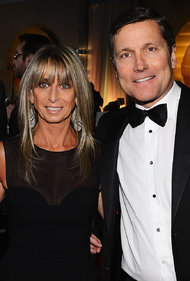NBCUniversal announced Monday that it was consolidating all of its cable entertainment properties under Bonnie Hammer, the longtime head of the USA network and other NBC cable channels. The move elevates Ms. Hammer to a position among the most prominent and powerful female executives in the television business.
 Larry Busacca/NBC Bonnie Hammer, who will now head all of NBCUniversal’s cable properties, and Steve Burke, the chief executive of NBC.
Larry Busacca/NBC Bonnie Hammer, who will now head all of NBCUniversal’s cable properties, and Steve Burke, the chief executive of NBC.
Chief among Ms. Hammer’s new responsibilities will be running the cable entertainment channels that had previously reported to another senior executive, Lauren Zalaznick. These include the highly successful Bravo channel.
NBC also announced a new role for Ms. Zalaznick, leading the company’s efforts to develop new digital properties and to find ways to make money in the area of emerging technologies.
Ms. Hammer and Ms. Zalaznick had long been considered friendly rivals within NBC because they each led rapidly growing — and financially successful — cable networks. But Ms. Hammer’s portfolio has always included more and bigger networks, and NBC’s chief executive, Stephen B. Burke, has pursued a strategy in recent years of consolidating separate operations under a single executive.
Most recently that has led to Pat Fili-Krushel gaining command of all of NBC’s operations in news. NBC Sports is led by Mark Lazarus and all of NBC’s sales operations are consolidated under Linda Yaccarino.
The elevation of Ms. Hammer means that NBCUniversal has three women in charge of important divisions within the company.
With the addition of the channels that had been under Ms. Zalaznick, which beyond Bravo also include Oxygen and Style, the portfolio Ms. Hammer controls is among the most extensive and lucrative in the television business. She already ran the operations of most of NBC’s successful cable entertainment channels, beginning with the most popular, USA, and including Syfy, the E channel and the G4 network. By adding the other channels, Ms. Hammer will supervise operations generating about half of the total cash flow of NBCUniversal.
In addition to her new duties, Ms. Zalaznick will continue to oversee two of NBC’s most successful current digital assets, the movie ticket sales site Fandango and Daily Candy, a food, fashion and travel site.
Mr. Burke also announced that Joe Uva, the former president of Univision Communications, would become the chairman of Hispanic Enterprises for NBCUniversal. The company’s chief Spanish-language asset is the network Telemundo.
Ms. Hammer’s elevation at NBC puts her alongside other top female executives in television, such as Anne M. Sweeney, who leads the television arm of the Walt Disney Company, and Abbe Raven, the top executive at the networks AE, History and Lifetime.
Article source: http://mediadecoder.blogs.nytimes.com/2013/02/04/hammer-given-authority-over-nbcs-cable-entertainment-channels/?partner=rss&emc=rss